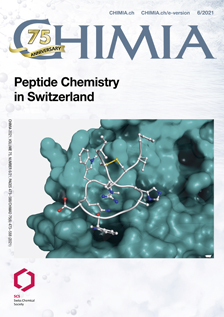Therapeutic Peptides as Emerging Options to Restore Misguided Host Defence and Homeostasis: From Teaching to Concept to Clinic
DOI:
https://doi.org/10.2533/chimia.2021.495PMID:
34233811Keywords:
Ace inhibitors, Complement, Host defence, Phage display, Peptide therapeuticsAbstract
Among the many molecular entities suitable for therapeutic use, peptides have emerged as a particularly attractive option for academic drug discovery and development. Their modular structure and extendibility, the availability of powerful and affordable screening platforms, and the relative ease-of-synthesis render therapeutic peptides highly approachable for teaching and research alike. With a strong focus on the therapeutic modulation of host defence pathways, including the complement and renin-angiotensin systems, the Molecular Pharmacy group at the University of Basel strongly relies on peptides to introduce students to practical aspects of modern drug design, to discover novel therapeutics for immune and inflammatory diseases, and to expand on options for the preclinical development of a promising drug class. Current projects reach from student-driven iterative design of peptidic angiotensin-converting enzyme inhibitors and the use of phage display technology to discover novel immune modulators to the development of protective peptide coatings for biomaterials and transplants and the structure-activity-relationship-guided optimization of therapeutic peptide drug candidates in late-stage clinical trials. Even at the current stage, peptides allow for a perfect circle between pharmaceutical research and education, and the recent spark of clinical applications for peptide-based drugs may only increase the value and relevance of this versatile drug class.Downloads
Published
2021-06-30
Issue
Section
Scientific Articles
License
Copyright (c) 2021 Oliver Schwardt, Christina Lamers, Clément Bechtler, Daniel Ricklin

This work is licensed under a Creative Commons Attribution 4.0 International License.
How to Cite
[1]
Chimia 2021, 75, 495, DOI: 10.2533/chimia.2021.495.







